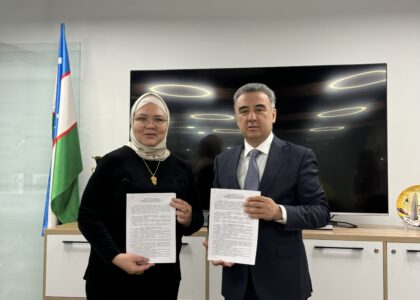From 25 to 29 November, 2015, in Tashkent, the capital of the Republic of Uzbekistan, IV International Banking Forum was held on the topic “Banking system of the Republic of Uzbekistan: status and trends, new challenges and solutions”.
The event was organized by the Information-Rating Agency SAIPRO with the official support of the Central Bank of the Republic of Uzbekistan.
The purpose of the forum was to discuss the status, challenges and priorities of the international banking system, development trends of modern banking and financial services; representation of the investment opportunities of Uzbekistan’s economy and participation of domestic commercial banks in attracting foreign investment; establishment and strengthening relations between representatives of national and foreign banking business, as well as with representatives of the banking system infrastructure.
Over 200 representatives of ministries and departments, banks, audit organizations and financial institutions, leasing companies, universities, international rating organizations from more than 10 countries attended the forum.
On November 26, 2015, the first day of the International Banking Forum, Ahadbek Khaydarov, Deputy Chairman of the Central Bank of the Republic of Uzbekistan, in his speech to the Forum dwelt upon the results of implementation of the program for further reforming and strengthening of the banking system in 2011-2015, approved by the Head of our State on November 26, 2010. He emphasized that the program promoted significant qualitative changes in the activities of the banks and high rate of the banking sector development in Uzbekistan over the past 5 years. Thus, within the period from 2011 to 2015: the total capital of the banking system of Uzbekistan increased 2.4 times (or in average 28.1% per year, against annual 22.4% growth within the period of 2000-2010); the total assets of banks increased 3.1 times (or in average 29.6% per year, against annual 21.8% growth within the period of 2000-2010); the credit portfolio of the Uzbekistan banks increased 3.7 times (or in average 33% per year, against annual 19% growth within the period of 2000-2010); deposits in banks increased 3.6 times.
Deputy Chairman of the Central Bank of the Republic of Uzbekistan also focused on the fact that small business is one of the main factors of sustainable social and economic development of the country. In particular, small businesses currently produce more than 53% of Uzbekistan’s GDP, their share in the total export of the country is 27%, and in total employment is 77.5%.
In achieving the above indicators, the active crediting of the sector by the banks plays an important role. Only within the last 5 years (2011-2015) the volume of credits provided to the small businesses has increased 4.4 times. At the same time, the share of credits allocated to small businesses in the total volume of crediting reached 28% against 16.9% in 2000.
Zafar Mustafayev, General Director of the Association of Lessors of Uzbekistan, has presented the leasing sector of Uzbekistan and the role of banks in the development of leasing services in our country. At the beginning of his speech, he noted that according to the survey carried out by Leaseurope at the end of 2014, the Republic of Uzbekistan has one of the 50 most developed leasing markets in the world.
 |
Then, he highlighted the stages of development of the leasing market in Uzbekistan in 1991-2010. In short, on the first stage (1991 — 1999), the international mechanisms were introduced and the legislative bases for leasing were formed, on the second stage (1999 — 2005), the legal framework in the field of leasing was improved and the leasing market developed, and on the third stage (2005-2010), the public awareness of leasing services was promoted and competitive environment in the leasing services market was created.
Further, in his presentation, Zafar Mustafayev spoke about the incentives for leasing in Uzbekistan. For example, the equipment imported to lease is exempt from VAT and customs payments, and the lease payments are exempt from VAT. In addition, the tax base of the lessee is reduced by the amount of interest on leasing and the leasing services are exempt from income tax up to January 1, 2017.
It is known that almost all leasing companies created before September 2002, were established basing on the appropriate Resolutions of the Cabinet of Ministers of the Republic of Uzbekistan, according to which certain tax exemptions there provided to them. Besides, each of them operated in a particular market segment, which practically did not overlap. Provision to the leasing of tax conditions similar to those provided to any other types of financing, especially to the bank credits, have created good prerequisites for the establishment of new leasing companies. Thus, within the period 1996-2014, the volume of leasing services in Uzbekistan increased from USD 1.0 million to USD 341.1 million, while the number of leasing companies increased from 4 to 83.
Currently, in the period of active technical re-armament of enterprises and, in general, of the national economy development, the leasing has a particular importance as a form of investment, allowing most effectively address the issues of renewal of fixed assets, increase of employment and introduction of innovations in the manufacturing sector.
As the result of the 1st half of 2015, 3.400 transactions were concluded at the leasing market of the Republic to the total amount over UZS 422 billion, and the total leasing portfolio exceeded UZS 2.3 trillion. Compared to the same period of the last year, the growth rate of leasing services was approximately 13.9%. A significant part of the leasing portfolio transactions was concluded by the leasing companies (totaling UZS 1.4 trillion), while the rest were concluded by the banks (UZS 919.6 billion). At the same time, it should be noted that the leasing portfolio of banks with the breakdown to their legal form was distributed as follows: leasing portfolio of state banks totaled UZS 648.9 billion and leasing portfolio of private banks – UZS 270.7 billion.
Among the objects for leasing, the manufacturing equipment is leading. On the results of the 1st half of 2015, its share in the total structure of leasing transactions was 34.1%. Besides, a significant amount of transactions were made with regard to agricultural machinery — 33.5%, automotive transport — 19.1%, real estate — 13.3%, etc.
As for the role of commercial banks in the leasing market development in the Republic of Uzbekistan, the speaker emphasized that in addition to the participation of banks in leasing transactions as lessors, they actively create joint ventures and subsidiary leasing companies, they provide credit lines to leasing companies to finance leasing projects. For example, the joint leasing companies established by banks include JV Uzbek Leasing International AO (the founders include the National Bank for Foreign Economic Activity of the Republic of Uzbekistan and Maybank, Malaysia), JLC JSC UzMed-Lizing, JSC Qurilishmashlizing, JSC LC Qurilish Lizing (the founders include the National Bank for Foreign Economic Activity of the Republic of Uzbekistan, JSCB Asaka Bank, Agro Bank, Uzsanoatqurilishbank, Ipoteka Bank), LC O’zavtosanoat-Leasing LLC, LC Asaka-Trans-Leasing LLC (one of the founders is JSCB Asaka Bank), Hamkor and Lizing LLC, Hamkormazlizing LLC, Hamkor Invest Leasing LLC, Partner Business Leasing LLC (one of the founders is the Hamkor Bank), and others. The subsidiary leasing companies established by the banks include Delta Leasing LLC (founder is the Kapitalbank), InFinLeasing LLC (founder is the InFinBank), Orient Finance Business LLC (the founder is PJSCB Orient Finance) and others.
Besides, the speaker noted that according to the current legislation, the amount of leasing services provided by commercial banks cannot exceed 25% of capital of the I-tier bank. This aspect stimulates the growth of leasing services provided by leasing companies.
The commercial banks finance the leasing companies by means of provision of revolving credit lines, project financing, transfer of the object of leasing with the possibility of further sublease, refinancing, provision of foreign credit lines, trade financing and provision of bank guarantees.
Then, the speaker presented 5 top Lessors of Uzbekistan in terms of amount of leasing operations at the end of the 1st half of 2015, among the banks and among the leasing companies, as well as a summary of several the most active leasing companies of the country.
At the end of his speech, Zafar Mustafayev announced the proposals to the commercial banks to promote the growth of leasing services in Uzbekistan through increase in financing of leasing companies and facilitating of leasing companies’ access to foreign credit lines.
Also, he stressed that further development of the leasing market in Uzbekistan depends on several factors, among which a favorable regulatory environment and a possibility to make profitable investments into leasing companies can pointed out. In addition, the current need of private and small businesses in the equipment for production of building materials, textile products, food and processing agricultural products, in the special construction machinery, auto transport (passenger and cargo vehicles), etc. is an incentive for continuous active operation of the domestic leasing companies.
On November 27, 2015, the second day, within the framework of the Forum, the Central Bank of the Republic of Uzbekistan in cooperation with the Fitch Ratings International Rating Agency held the regular annual conference devoted to assignment of international rating to the commercial banks.
It was noted at the conference that assignment of positive ratings to the banks by the international rating agencies shall create necessary conditions for the domestic banks to operate at the international banking market. At present, 26 commercial banks of our country have a development forecast as “Stable” assigned by the leading international rating agencies, and 8 of them received the rating from Fitch Ratings international rating agency.
These ratings mean the existence of effective banking supervision carried out by the Central Bank, ability of our country’s banks to perform all their term liabilities in a timely manner, ability to diversify assets at the appropriate level, to manage risk, which are an integral part of banking operations. The conference discussed issues related to the analysis of financial statements of the banks and the Fitch Ratings’ rating methodology, as well as the introduction of modern system for evaluation of commercial banks activities based on international norms and standards.
According to the Fitch Ratings Agency, the favorable macroeconomic environment in the country was the main factor for the assignment of development forecast to the Uzbek banks at “Stable” level. In particular, GDP growth remains high due to the significant volume of state investments, the growth of domestic consumption and the implementation of long-term structural reforms. Fitch Ratings evaluates the funding of Uzbek banks as a stable one, which is based on internal sources. Foreign credit lines mostly come from international financial institutions and foreign banks (ADB, World Bank and the China EximBank) under the project financing programs.
 |





